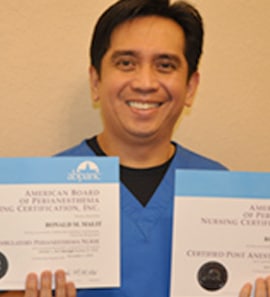
Ronald Malit | BSN, RN, CPAN, CAPA
My Certification Story
I have been a PACU Nurse for almost 20 years now. Nursing is my second career and I am so happy that I found my niche in PeriAnesthesia Nursing. It has been a rewarding and enjoyable experience from the beginning and through all those 19 years in the PACU up to now. In 2012, I decided to go back to school for my BSN which I kept on postponing. I was able to finish it within a 14 month period. When our hospital began its journey for Magnet Certification, I knew I needed to do more, and so I decided to take the CPAN Certification. I did it mainly for my patients, to challenge myself and for career advancement. It was difficult to balance family life, a full time job and studying for certification. With determination and discipline, I was able to pass the CPAN Examination during my first attempt in the spring of 2015. My certification did not end there. I felt like there was something missing, so once again I challenged myself to obtain dual certification. In the fall of 2015, I successfully obtained my CAPA Certification.
My Study Strategies
The reference that I used the most during my self review was Drain's PeriAnesthesia Nursing, A Critical Approach. I divided the chapters and made sure to read each chapter. I read the latest edition of the ASPAN Standards, Practice Recommendations and Interpretive Statements. Two weeks before my scheduled exam, I focused on practice questions and used Putrycus and Ross's Certification Review for PeriAnesthesia Nursing. I gave myself 12 weeks to prepare for my CPAN exam. Since I already did most of the readings in preparation for my CPAN Certification, I spent less time preparing for my CAPA Certification which was scheduled 6 months after my CPAN Exam.
My Benefits
Obtaining both CPAN and CAPA Certifications and being the very first dual certified CPAN & CAPA RN in our unit is a validation for my love and passion to this nursing specialty. Having both certifications will not only advance my career as far as the hospital's clinical ladder is concerned, but most importantly I am confident that our patients would benefit from receiving the safest and best possible care that they deserve. In addition to my current role as the PACU Evening Charge Nurse, after gaining certification I have been given more roles such as the Unit's Evidence Based Practice Chair, A Magnet Champion, EPIC Super User, Preoperative Resource person, and our unit's representative to hospital wide self governance committees such as the Medication Safety Committee.
My Advice
In my opinion, both CPAN and CAPA Exams are equally challenging. It takes determination, patience during preparation and discipline especially if you are balancing a full time job, family life and studying. Your decision to take the certification exam is the first and most important step. Once you start the journey to certification, your commitment is necessary until you reach your goal. You will find that you will gain additional knowledge applicable to your practice. If you do not pass the exam during your first attempt, do not give up! Press on and tell yourself that giving up is not an option, knowing that at the end you will eventually become a proud CPAN/CAPA RN !
